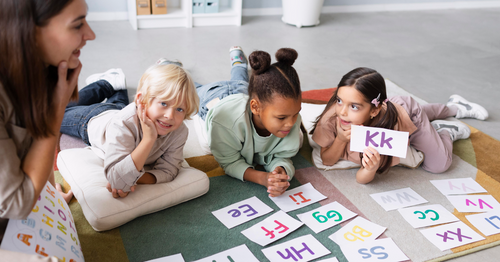Teaching English as a second language can be challenging, especially for young learners, who may struggle to understand new concepts and vocabulary. However, using videos and TV shows can be an effective and engaging way to teach English as a second language. Videos provide context, visuals, sounds, and a variety of themes that can help students of all ages learn English more effectively.
In this article, we will explore the benefits of teaching English through movies and TV shows, as well as provide some practical tips and ESL activities that you can use with your students. Allright.com shares a guide on how to teach English through Movies and TV shows.
Practice Tips to Really Learn English with Films and TV Shows:
Choosing what to watch
To effectively learn English through films and TV shows, it is important to choose content that is engaging and interesting. Watching a boring movie can lead to difficulty paying attention for the entire duration. Opt for TV series as their episodes are shorter than movies. Repeatedly watching a particular video or TV show can help children become familiar with the characters and their way of speaking, making it easier for them to learn.
The best videos/TV shows for learning English should have clear pronunciation, be spoken at a moderate pace, and have plenty of visual aids to illustrate what is being said. They should also feature a lot of language repetition and have a good picture and sound quality. If you're not sure what to watch, consider checking out top-rated children's TV shows for inspiration.
For children aged 5-12, choose videos/TV shows that are targeted to their age group, as they often have plenty of repetition and opportunities for kids to join in, repeat language, and copy actions. Young children tend to enjoy hearing their favorite stories, songs, and videos/TV shows multiple times, which can help build their understanding and confidence in repeating the language.
For teenagers aged 13-18, watching different film trailers and discussing what happened in each one, comparing the films, and deciding which one to watch can be an effective way to learn English. This activity could be extended by asking the students to invent an ending to the film and act it out. Writing film reviews as a follow-up can also help students prepare for Cambridge English Qualifications such as B2 First. The highly recommended film is “Harry Potter”. Allright.com provides a wealth of teaching materials for English language teachers, including videos, flashcards, and interactive exercises.
English learning activities – before watching the show
Before watching a video/TV show, it is important to engage in English learning activities to prepare students for the language they will encounter. This can help improve their understanding of what is happening in the show.
One learning tip is to read the title of the video/TV episode and ask students to predict what will happen. This can help them develop their language skills and actively engage in the learning process.
Another activity is to try to include brainstorming vocabulary related to the topic of the show, reading fun facts or storybooks related to the topic, or checking out the video/TV show's website for free learning activities. These activities can help children become familiar with the language and topics they will encounter, making it easier for them to learn and enjoy the show.
Watching without subtitles
It may take some time for students to be able to watch a video/TV show without subtitles. To help them transition, you can try watching an episode in their native language to become familiar with the characters, watching an episode in English with English subtitles for additional support, and finally, watching an episode in English without any subtitles.
When watching the show, encourage students to listen for the general idea of what is being said, rather than trying to understand every single word. This can help them develop their listening skills and improve their ability to understand English.
It's also a good idea to have students keep a notebook handy while watching. They can write down any new words and expressions they come across to look up later, which can help them expand their vocabulary and improve their understanding of the language.
Ask your students to repeat short phrases
Sometimes, your students might hear something cool in the movie. For example, some short phrases, or slang like, “hell yeah!” or “Sure thing” or “You betcha!” are commonly used in English. Surely, you want your students to sound natural. Ask them to repeat the phrase a few times. After saying it out loud for a while, they will be able to remember it for a longer time! It’s a great and enjoyable exercise.
English learning activities – while watching the show
While watching a video/TV show, it's important to focus on developing listening skills, particularly the ability to listen for the general idea of what is being said.
During the show, you can check your students' understanding by asking questions like "What just happened?", "Why did they do that?", "How do you think they feel?", and "What do you think will happen next?" This can help students engage with the content and improve their ability to comprehend English.
Before starting the show, you can also ask students what they think will happen in the episode. After watching for a bit, you can pause and ask them if their predictions were correct. These activities can help children stay engaged and actively involved in the learning process while watching the show.
It’s okay to miss words… just let it go
Last, of all, remember what we said at the start? Watching movies should be fun, so if your students miss a word, a phrase, or even many sentences, that’s okay! Just allow them to follow along with the subtitles and learn that way. Don’t make them feel bad. Watching films is supposed to be fun!
English learning activities – after watching the show
After watching a TV show in English, it is important to engage in additional learning activities to help children improve all four language skills: reading, writing, speaking, and listening. One simple activity is to have a discussion with the students about their favorite episode and encourage them to describe their favorite parts in English.
For younger children, speaking activities could include pretending that a toy or puppet only understands English and having a conversation with it to encourage them to do the same in private. Another option is to encourage students to act out their own version of the TV show. Listening activities could include finding an interesting picture from the show and asking questions about it, printing out photos of favorite characters, and playing a guessing game.
For older children, a great activity is to have them create a voice-over for an exciting part of the program by watching the scene multiple times, writing down keywords, and creating a simple script that they can then read or act out while watching the scene without sound. Though teaching English through TV shows or videos can be challenging, it provides children with a chance to sound natural and make fewer mistakes and can motivate them to love and understand the language.
In conclusion, teaching English to kids through TV shows or videos sometimes can be challenging, but it gives the children the chance to sound natural and make fewer mistakes. It motivates them to love English and understand it.









